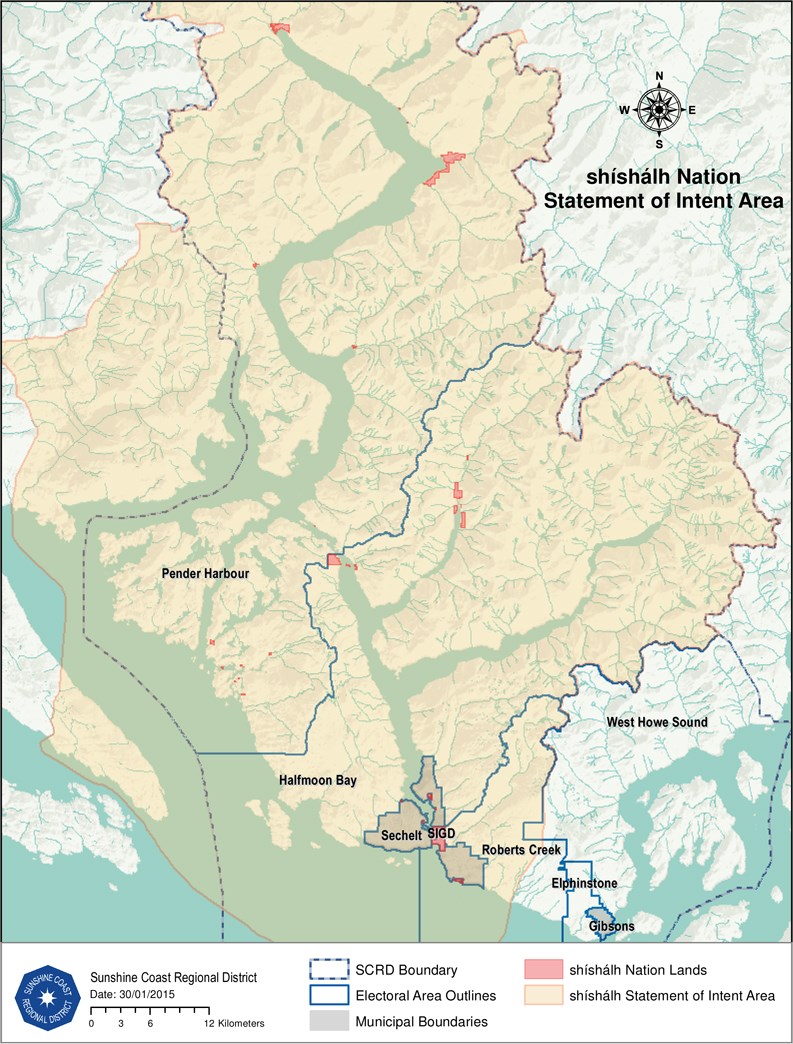The Sechelt Indian Band (SIB) was the first band in Canada to achieve self-governance in 1986 and break free from the Indian Act.
Under the Indian Act, the SIB had no ownership of the land it inhabited and the members were told how the band could operate by the federal government. The act also defined who could and could not be considered a member of the SIB.
The new Sechelt Indian Band Self-Government Act transferred lands to the SIB for the “use and benefit of the Band and its members” and gave ultimate control of those lands to the SIB.
The purpose of the act was to “enable the Sechelt Indian Band to exercise and maintain self-government on Sechelt lands and to obtain control over and the administration of the resources and services available to its members.”
The agreement allowed for:
• The transfer of approximately 1,030 hectares of “Sechelt reserve lands” spread between 33 different parcels that include traditional territory sites up Sechelt Inlet (see map).
• Granting of complete responsibility for the management, administration and control of those lands
• Making the SIB a legal entity with rights and powers to enter into contracts or agreements, to acquire, hold, sell or dispose of property, and to expend, invest or borrow money
• The creation of a new band constitution, which among other things gave the SIB the power to add members to the band by way of a yes vote from at least 75 per cent of band electors
• The establishment of an elected council with legislative powers to make laws relating to:
- Access to and residence on Sechelt lands
- Zoning and land use planning
- The use, repair and demolition of buildings and structures on Sechelt lands
- Taxation for local purposes
- Education of band members on Sechelt lands
- Social, health and welfare services
- Preservation, protection and management of natural resources and animals on Sechelt lands
- Order and safety on Sechelt lands
- The construction, maintenance and management of roads and regulation of traffic on Sechelt lands
- The operation of businesses, professions and trades on Sechelt lands
- The ability to prohibit the sale, supply, manufacturing or possession of “intoxicants” on Sechelt lands
- The imposition, on summary conviction of fines or imprisonment for the contravention of any law made by the band government
- The conduct of band elections and referendums
- The creation of administrative bodies and agencies to assist in administration of the affairs of the SIB
The agreement also set up the Sechelt Indian Government District (SIGD) as having jurisdiction over all Sechelt lands.
The agreement states: The District is a legal entity and has the capacity, rights, powers and privileges of a natural person and, without restricting the generality of the foregoing may: enter into contracts or agreements; acquire and hold property or any interest therein and sell or otherwise dispose of that property or interest; expend or invest moneys; borrow money; sue or be sued; and do such other things as are conducive to the exercise of its rights, powers and privileges.
The members of the SIB council also make up the SIGD council under the agreement.



